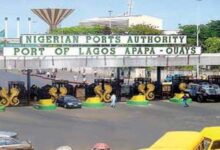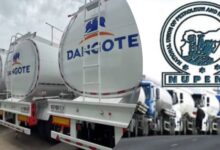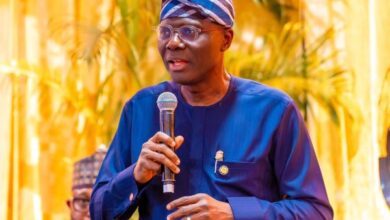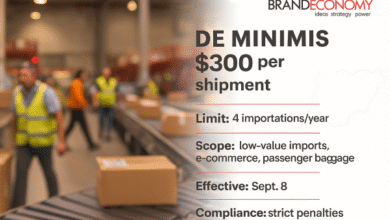Foreign dominance in shipping business, national risk -Ex-NIMASA DG
 A former Director-General of the Nigerian Maritime Administration and Safety Agency (NIMASA), Mr Temisan Omatseye, has described the dominance of foreign vessels in the maritime sector as a national risk.
A former Director-General of the Nigerian Maritime Administration and Safety Agency (NIMASA), Mr Temisan Omatseye, has described the dominance of foreign vessels in the maritime sector as a national risk.
Omatseye said this at the fifth Taiwo Afolabi Annual Maritime (TAAM 5.0) conference on Friday in Lagos.
The conference organised by SIFAX Group in collaboration with the Maritime Forum, University of Lagos had the theme: “The Maritime Roadmap Project – Making Nigeria a Leading Maritime Nation in the World.”
“The failure to take control of the supply chain of our goods most especially as it relates to shipping must be considered as a national risk.
“This is so because we cannot totally depend on foreign shipowners who basically determine the freight rates to charge and vessels to bring in or take goods out of Nigeria. Can you imagine handing over our destiny to foreigners?
“This is what is happening now in the shipping industry. I can categorically tell you that of the 100 percent of goods that leave and come into Nigeria, Nigeria carry only two percent, 98 percent is carried by foreigners,” he said.
Omatseye noted that the reliance on foreign vessels to carry Nigerian minerals and exports at their determined rates higher than market rates had made Nigeria goods uncompetitive in the international market.
He added that the high rates of import had an inflationary effect on the nation’s economy.
According to Omatseye, previously, a tanker that used to bring petroleum products at $20,000 per day for charter, now charges Warri $55,000 Warri and Calabar $89,000 per day.
Omatseye who wondered where the money was going to said that the industry would be the worst hit when government removes subsidy, stressing that freight rates would be outrageous.
“Citing an example with the piracy issue in the Gulf of Guinea around Somalia. During that period, international shipping lines increased their rates, Ethiopia which is a landlocked country maintained its own freight rate while the likes of Mersk increased.
“People started moving goods through Ethiopia because the international shipping lines were losing money, they were forced to drop their freight rates. But in Nigeria, we do not have that kind of opportunity because we do not have any ship,” he said.
On the way forward, he called on the Federal Government to approve and develop additional seaports as well as a national shipping line to reduce foreign dominance.
He noted that Nigerian shipowners should be given the criteria to register as a national carrier in line with Section 35 of NIMASA Act.
He said that this would allow them to take advantage of federal law to carry state, and local government cargo, both liquid and bulk.
“Government have done its best when it comes to laws about shipping, they are good, excellent, what we need to do is to operationalise laws that we have as Nigerians and not allow foreigners to intimidate us.
“Section 35 of NIMASA Act says clearly that national carriers shall have exclusive rights to the export and import of cargo belonging to the federal, state, local government including federal and state owned companies and agencies.
“Government should ensure the disbursement of the Cabotage Vessel Financing Fund by putting in place implementable regulations,” he said.
Also speaking, Dr Taiwo Afolabi, the Chairman SIFAX Group, said the Nigerian maritime industry could rank among the best in the world with proper funding, good policies, enabling environment, manpower and massive infrastructure development.
Afolabi represented by Mr Bode Ojeniji, the Managing Director, Sky Capital, opined that good foundation for the sustainable growth and positioning had been laid by the professionally-run government agencies.
“The development of new ports and inland container depot’s across the country is a testament of the abiding faith of investors in the industry and the rail development linking seaports to dry ports is a game changer,” he said.
Dr Bashir Jamoh, the Director-General of NIMASA, said that the conference provided a unique opportunity to discuss the strategies and policies which cumulatively represent the roadmap that would convey Nigeria to the status of a leading maritime nation.
Jamoh represented by Mrs Olamide Ogunsonya, Director Audit, added that there were universal acceptable criteria for evaluating the status of individual country in a commity of nations.
The NIMASA boss listed them to include capacity in terms of shipbuilding and repairs, banking system, available of institutions for the training of certification of seafarers, and others.
“Nigeria remains a work in progress when compared to some of the global maritime powers who have mastered sea-going trade for several centuries.
“But we make bold to say that Nigeria has earned the right to be taken seriously and respected in the international level.
“Our acquisition as a regional leader remains unassailable whether in terms of volume of trade or ascertion to key maritime inventions and the development of in-country capacity . The future is indeed for Nigeria shipping,” he said.
The TAAM Conference was birthed to serve as a platform where key issues that will engender innovations and practical ideas needed to sustain the growth of be maritime sector are discussed to proffer workable solutions.











